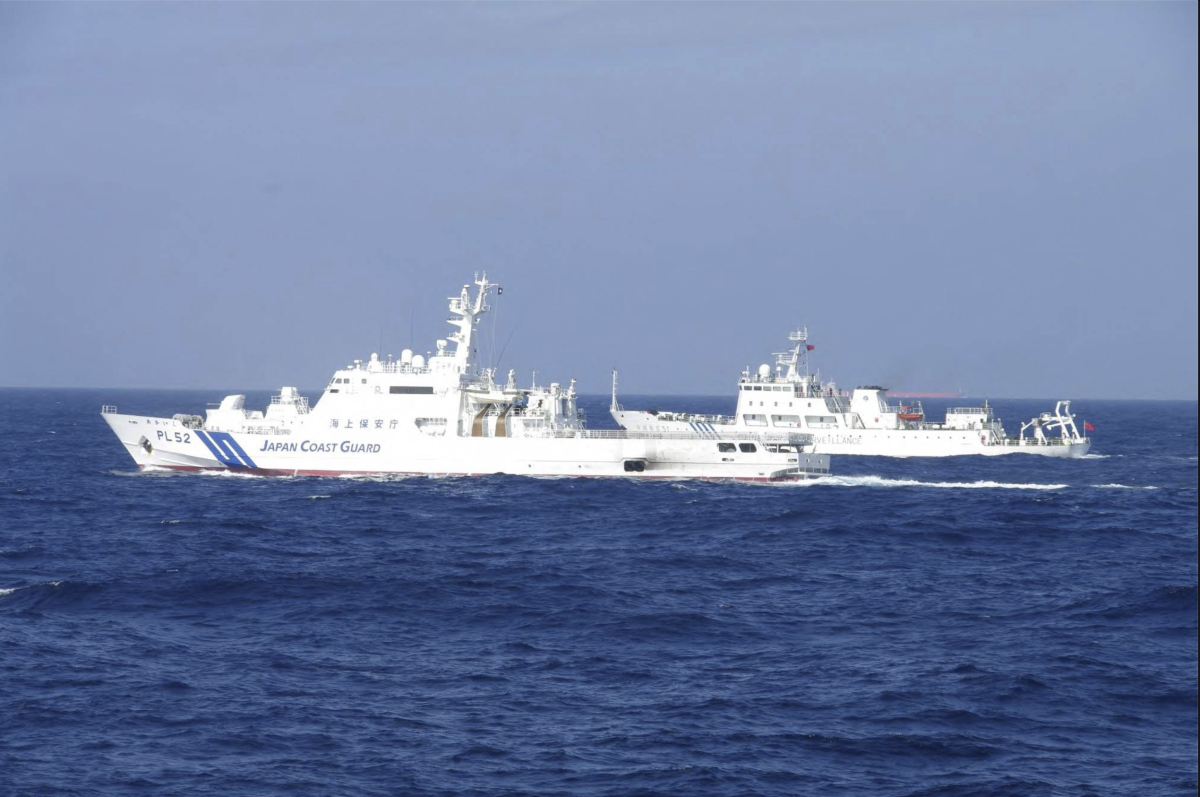China is quietly ramping up its pressure tactics against a critical U.S. ally in Asia by sailing armed government vessels to a disputed island group on a near-daily basis.
The Chinese coast guard on Sunday said it had driven away Japanese boats from waters around the Senkaku Islands, which is administered by Tokyo but claimed by Beijing and, to a lesser extent recently, Taipei.
The Senkakus are five uninhabited islets and three barren rocks, situated approximately 120 miles northeast of Taiwan and 200 miles southwest of Japan's Okinawa prefecture.
Beijing has become increasingly assertive in the area in the decade since Tokyo nationalized the islands in 2012. It has dispatched record numbers of large ships—some armed with autocannons—into the contested waters in order to stamp its authority.
Chinese coast guard spokesperson Gan You said Chinese ships had taken "necessary measures" and warned a Japanese fishing boat and several Japan Coast Guard patrol ships that had "illegally entered territorial waters around the Diaoyu Islands," its name for the Senkakus.
Similar standoffs over the isles are now a regular feature in the East China Sea, where the two major powers continue their decade-long tussle over the otherwise unassuming features that could one day unlock China's unimpeded access to the vast waters of the Pacific.
The United States, which takes no position on sovereignty over the Senkakus, recognizes Japan's control over them. Since at least 2014, the U.S-Japan security treaty has covered attacks on Japanese government assets around the islets.
The Chinese foreign ministry didn't immediately respond to Newsweek's request for comment before publication.

Statistics published in early December by Japan's Foreign Ministry showed Chinese coast guard ships undertaking regular missions into the contested waters around the Senkakus each month this year.
The number of Chinese vessels tracked within the island group's 12-nautical mile territorial sea ranged from 4 to 16 in the first 11 months of 2023, according to the data. Ships found in the bordering 24-nautical mile contiguous zone, however, numbered in the dozens and at times over 110.
The white hulls of the China Coast Guard ships allegedly harass Japanese fishing boats in the area and typically anchor themselves in the waters for hours or days before sailing away. A few hours later, they return to repeat the activity, in a trend that has gradually increased since 2018.
"It is extremely regrettable that China Coast Guard vessels have continued to navigate within the contiguous zone near the Senkaku Islands and have repeatedly intruded into Japan's territorial waters," Mizobuchi Masashi, assistant press secretary at the Japanese Foreign Ministry, told Newsweek.
Tokyo considers Beijing's activity "extremely serious," Mizobuchi said, adding that the Japanese coast guard has consistently broadcast warnings to the vessels as well as "lodged severe protests" through diplomatic channels.
The Japanese government reaffirms its commitment to respond prudently and decisively, adhering to its policy of staunchly safeguarding the lives, assets, territorial waters and airspace of its citizens, the spokesperson said.

Although encounters between Japan's coast guard and its increasingly heavily armed counterpart have seldom escalated to the levels seen in the South China Sea, any armed attack on Japan's government vessels is likely to trigger an American military intervention, as would an attack on Philippines troops under the U.S.-Philippines Mutual Defense Treaty.
"Until about 2009 or 2010, the United States government didn't pay significant attention to the Senkakus. But as Chinese pressure on the Senkakus escalated, it compelled the Americans to confront the issue. Grant Newsham, a retired Marine colonel who worked closely with Japan's self-defense forces, told Newsweek in October.
"Japan strongly advocated for a clear stance from the U.S. concerning the Senkakus," he said.
U.S. Defense Secretary Lloyd Austin, in an October meeting with Japanese counterpart Kihara Minoru, emphasized the common challenges that both countries faced from China, North Korea and Russia. Austin underscored the "ironclad" nature of Washington's obligation to defend Japan, including in the Senkakus.
The origins of increasing Chinese assertiveness in the area can be traced back to 2008, when China's State Oceanic Administration dispatched two ships into Japan's territorial waters near the Senkakus. This marked the beginning of China's challenge to the existing order, Japan's Foreign Ministry said.
Subsequent incidents heightened tensions: in 2010, a Chinese fishing vessel collided with Japan Coast Guard ships at the Senkakus. Two years later, the Japanese government acquired ownership of three of the islets, leading to the uptick in Chinese coast guard activity, visible in available data.
This past April, Chinese coast guard ships further pushed the envelope by remaining in the islands' territorial sea for a record 80 hours and 36 minutes, despite Japan's orders to leave.
In February 2021, China's enactment of a new Coast Guard Law raised international concerns due to provisions authorizing the use of weapons. The maritime patrol agency is now among Beijing's favorite tools for so-called "gray zone" coercion, or acts that deliberately fall short of war.
Uncommon Knowledge
Newsweek is committed to challenging conventional wisdom and finding connections in the search for common ground.
Newsweek is committed to challenging conventional wisdom and finding connections in the search for common ground.
About the writer
Micah McCartney is a reporter for Newsweek based in Taipei, Taiwan. He covers U.S.-China relations, East Asian and Southeast Asian ... Read more





